On July 20, Chinese media reported the formal inauguration of a new research center located within the Ministry of Foreign Affairs, the “Center for Research of Xi Jinping Thought on Diplomacy” (习近平外交思想研究中心). The news made the rounds on the internet, and here is the notice as it appeared on the website of the official Xinhua News Agency.
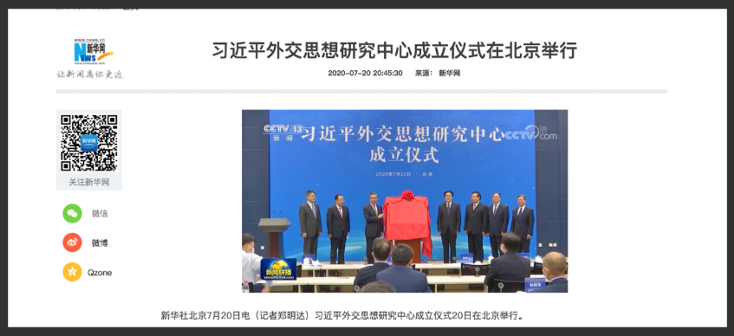
But let’s consider a bit more carefully the language used to report this grand opening. China’s foreign affairs minister, Wang Yi (王毅), delivered a speech at the event in which he said, according to the version released by the Ministry of Foreign Affairs: “Xi Jinping Thought on Diplomacy with Chinese Characteristics for the New Era, or Xi Jinping Thought on Diplomacy, provides the fundamental guide for Chinese diplomacy entering the new era.”
To those not attuned to China’s political discourse, this may not sound significant – aside perhaps from illustrating the Chinese Communist Party’s penchant for verbosity. Why this hesitation between an unnecessarily wordy phrase and a much more concise version of the same idea? But we have, on either side of this very significant little word, “or” (即), two markedly different phrases, which I’ll list out here for clarity’s sake:
Xi Jinping Thought on Diplomacy with Chinese Characteristics for the New Era
Xi Jinping Thought on Diplomacy
Is this some sort of word game? No. In fact, this is an example, playing out right before our eyes, of an important process of rhetorical evolution within the Chinese political discourse: the act of abbreviation (缩略), or the condensing of long and involved phrases and concepts into concise phrases with greater political potency.
As I’ve said again and again, words play a crucial role in signaling power and standing within the Chinese Communist Party. Since the 19th National Congress of the CCP was held in November 2017, during which the general secretary’s “banner term,” (旗帜语), “Xi Jinping Thought on Socialism with Chinese Characteristics for the New Era,” was written into the Party’s charter, I have pointed out that Xi’s next rhetorical coup in terms of solidifying his power and legacy would be to successfully shorten this lengthy 16-character phrase into the concise five-character “Xi Jinping Thought.” This abbreviated banner term would put Xi on even rhetorical footing with his most powerful predecessors, Mao Zedong (“Mao Zedong Thought”) and “Deng Xiaoping” (“Deng Xiaoping Theory”).
Despite the fact that “Xi Jinping Thought” has been reported as a fait accompli in the international press (as here and here), purely to avoid the unpalatable length of Xi’s power-phrase, the transformation is not yet complete. During the first half of 2020, we have not yet seen the abbreviated form of Xi Jinping’s banner term in use, and getting there is a delicate matter, about constantly testing the political waters internally.
This testing has happened in part through a number of abbreviations of Xi’s banner term evolving within Chinese political discourse and applied to specific policy areas. These abbreviations, far from being incidental, must be regarded as chess moves in the longer rhetorical game, in which the ultimate victory will be the final transformation of Xi Jinping’s 16-character banner term into a 5-character banner term.
In March 2017, just a few months after Xi Jinping formally secured his status as China’s “core” leader at the Sixth Plenum of the 18th Central Committee in the fall of 2016, Ji Bingxuan (吉炳轩), vice-chairman of the standing committee of the National People’s Congress, repeatedly used the phrase “Xi Jinping Thought on Economics” (习近平经济思想). This was at least half a year before the direction of Xi’s new banner term was clear, but in retrospect was perhaps a foreshadowing. (Interestingly, the phrase has not been used in this abbreviated form since the introduction of Xi’s full banner term in late 2017, preference instead being given to “Xi Jinping Socialist Economic Thought With Chinese Characteristics”).
Also in March 2017, Zhejiang Daily, the official CCP mouthpiece of the Party committee in Zhejiang province, used the phrase “Xi Jinping Thought on Ecological Civilization” (习近平生态文明思想). In June 2017, Foreign Minister Wang Yi first used “Xi Jinping Thought on Diplomacy,” yet another act of foreshadowing. And in October 2017, the phrase “Xi Jinping Thought on Strengthening the Military” (习近平强军思想) first appeared in the Resolution released as the curtain closed on the 19th National Congress.
In my “China Discourse Report 2018,” covering the first full year after the formal introduction of Xi’s banner term, I looked at more than 20 different permutations of “Xi Thought” appearing in the Party-state press in 2018. These included:
“Xi Jinping Thought on Diplomacy” (习近平外交思想), “Xi Jinping Thought on Literature and Art” (习近平文艺思想), “Xi Jinping Thought on Strengthening the Military” (习近平强军思想), “Xi Jinping Thought on Education” (习近平教育思想), “Xi Jinping Thought on Ecological Civilization” (习近平生态文明思想), “Xi Jinping Thought on Party Construction” (习近平党建思想), “Xi Jinping Thought on Rule of Law” (习近平法治思想), “Xi Jinping Thought on Battling Poverty” (习近平脱贫攻坚思想), “Xi Jinping Thought on Rural Revitalization Strategy” (习近平乡村振兴战略思想), “Xi Jinping Thought on News and Public Opinion” (习近平新闻舆论思想), “Xi Jinping Thought on the Press” (习近平新闻思想), “Xi Jinping’s Important Thought on Taiwan” (习近平对台工作重要思想), “Xi Jinping Thought on Targeted Poverty Alleviation” (习近平精准扶贫思想), “Xi Jinping Thought on Education” (习近平体育思想), “Xi Jinping thought on Youth Work” (习近平青年工作思想), “Xi Jinping Though on Finance” (习近平金融思想), “Xi Jinping Thought on Ethnic Work” (习近平民族工作思想), “Xi Jinping Thought on Ethnic Unity” (习近平民族团结思想), “Xi Jinping Thought on Clean Politics” (习近平廉政思想), “Xi Jinping Thought on Belt and Road” (习近平一带一路思想), “Xi Jinping Thought on Marine Development” (习近平经略海洋思想), “Xi Jinping Thought on Military-Civilian Integration” (习近平军民融合思想).
But it was clear around the fourth quarter of 2018 that the enthusiasm had been too unbridled in the months following the 19th National Congress in late 2017, and the leadership made moves to clear away the noise and confusion by stemming the flood of the various forms of “Xi thought.” China’s political discourse had perhaps reached peak confusion in October 2018 as the People’s Daily released a color-coded flow chart purporting to explain the relationship between various branches of “Xi Thought,” meant to be a sort of instructional outline.
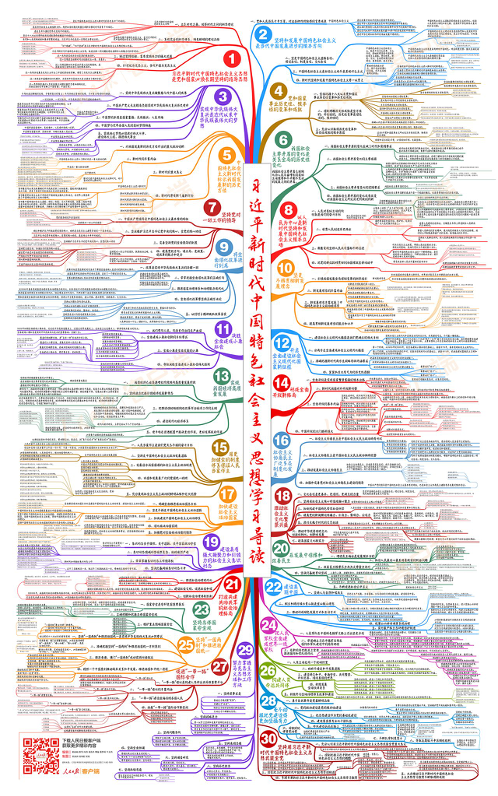
The streamlining that began in late 2018 focused on just four permutations of “Xi Thought.” These were: “Xi Jinping Thought on Strengthening the Military” (习近平强军思想), “Xi Jinping Thought on Diplomacy” (习近平外交思想), “Xi Jinping Thought on Ecological Civilization” (习近平生态文明思想) and “Xi Jinping Socialist Economic Thought With Chinese Characteristics” (习近平中国特色社会主义经济思想). These were the four major “thoughts” branching off from Xi’s banner term, and staking Xi’s claims to legacy in key areas of policy. The last of them was actually the disabbreviation of “Xi Jinping Economic Thought,” which as I said previously, had been used before the formal introduction of Xi’s banner term, at a time when its use was less delicate in the sense that it did not amount to a grandiose claim to a “Thought.”
The following graph plots the occurrence of each of the four “thoughts” for five six-month periods beginning with the first half of 2018:
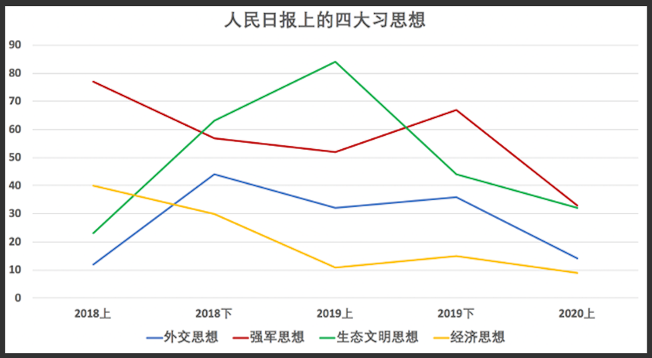
Generally, none of these terms are used with great intensity in the People’s Daily – not the same level of intensity we would expect to see for phrases like “reform and opening” (with the 40th anniversary held at the end of 2018) or “Belt and Road” (touted loudly in China’s foreign policy). “Xi Jinping Thought on Strengthening the Military” peaks at the end of 2018, and “Xi Jinping Thought on Ecological Civilization” peaks in the first half of 2019, but by the first half of this year all of these terms are noticeably down.
“Xi Jinping Thought on Diplomacy,” which appeared in 44 separate articles in the People’s Daily in the second half of 2018, as “Xi Thought” permutations were generally on the rise, registered just 14 articles in the first half of 2020. If we look at the four major permutations of “Xi Thought” in the first half of 2020 in the People’s Daily, here is what we get:
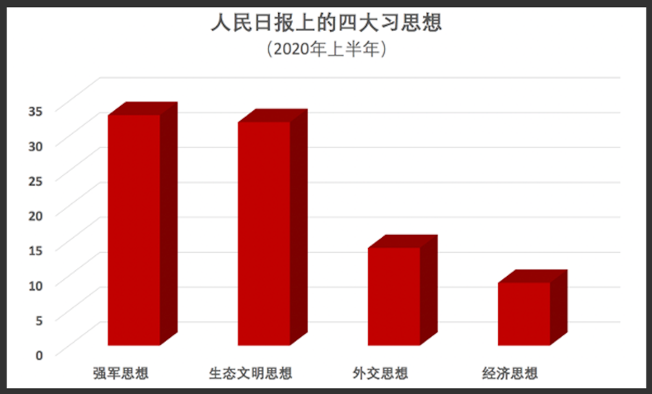
Clearly, the emphasis in the CCP’s flagship newspaper when it comes to the legacy phrase “Xi Thought” is on defense and environmental policy.
When we broaden the search to look at all Chinese newspapers for the same period, based on the Qianfang database, we see a slightly altered picture. The Xi legacy term for environmental policy is the clear leader in terms of volume of coverage, while defense comes in a distant second, with less than half as many mentions.
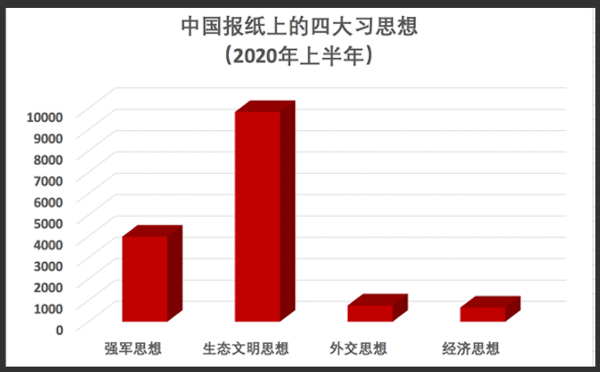
It is clear from the graph immediately above that “Xi Jinping Thought on Diplomacy” and “Xi Jinping Socialist Economic Thought With Chinese Characteristics” have not received the same level of emphasis as the legacy terms dealing with defense and environmental policy. But why should this matter? Well, this is what brings us back to Wang Yi and his new “Center for Research of Xi Jinping Thought on Diplomacy.”
It matters because while these buzzwords are ultimately about Xi Jinping’s legacy and power as the Chinese Communist Party’s “core” leader, they also play a crucial role in signaling political achievements in key areas. The four thoughts represent four key areas of priority: the military (军队), foreign affairs (外交), environmental protection (环保) and the economy (经济). And to some extent, the way these terms perform in the media, and particularly in the party-state media, reflect perceived administrative achievements in these areas. When there are achievements to boast about in a particular arena of policy, these are reflected through association with Xi’s legacy, and the related “Xi Thought” rises correspondingly.
As the man responsible for progress in one of the four key sub-fields of the evolving “Xi Jinping Thought,” Wang Yi surely does not wish to be left behind. Seen from this perspective, the formation of the new research center at the Ministry of Foreign Affairs could be seen to show Wang Yi’s anxiousness about catching up.
This is only the second research center formed for a specific “Xi Thought.” The first center, established at the outset of 2018, was the “Research Center for Xi Jinping Thought on Strengthening the Military,” now housed within the People’s Liberation Army’s Academy of Military Science. There are as yet no centers for “Xi Jinping Thought” on the economy or the environment.
The simpler way to see this, perhaps, is that the “core” leader associates himself with success, and his banner term serves as a stamp of approval on the work of others. In the area of environmental policy, at least, the progress is relatively easy to identify, including a “stunning turnaround” over the past decade in how China has tackled pollution. Though there are still many questions about China’s commitment, the country has been recognized in many quarters as a global leader in clean energy and sustainable development. So this is one area where Xi Jinping can attach his name and legacy to progress being made. The economy is another story. While the party-state media are duty-bound to present China’s economic story in a positive light, things have been difficult in recent years, with unrelenting US-China trade tensions and most recently the economic hit from the COVID-19 pandemic. This is perhaps not the time, not yet, to loudly declare the victories of “Xi Thought on Economics.”
The rhetorical chess game is three-dimensional. Xi Jinping is ultimately looking to firm up his power and legacy through a crowning achievement in the political discourse – the shortening of his lengthy 16-character banner term, “Xi Jinping Thought on Socialism with Chinese Characteristics for the New Era,” into the punchy, 5-character “Xi Jinping Thought” (习近平思想). But to do so, he must still proceed carefully. And all of the various spheres of policy-making potentially impact his ability to make progress in the long race toward the finish line of power and legacy.
Where is that finish line exactly? This is difficult to say. But there are two very strong candidates for the timing of the full-fledged announcement of the arrival of “Xi Jinping Thought.” The first would be July 1, 2021, marking the 100th anniversary of the founding of the Chinese Communist Party. The second would be in the fall of 2022 as the curtain opens on the 20th National Congress of the CCP.
Either way, the spectators do not have long to wait.
[Featured Image: Chinese Foreign Minister Wang Yi, who recently inaugurated a new center for “Xi Jinping Thought on Diplomacy.” Image by the Austrian Foreign Ministry, available at Flickr.com under CC license.]




















